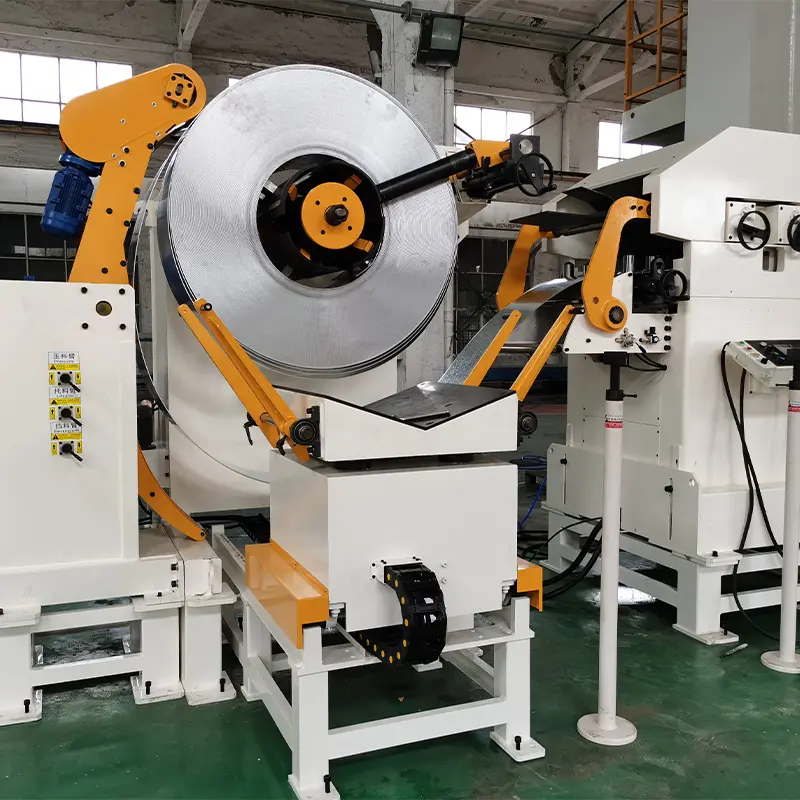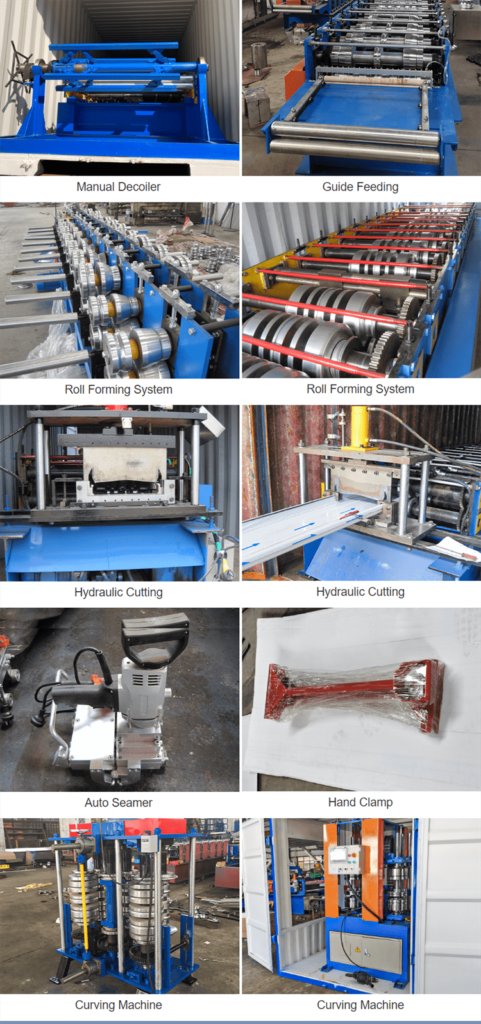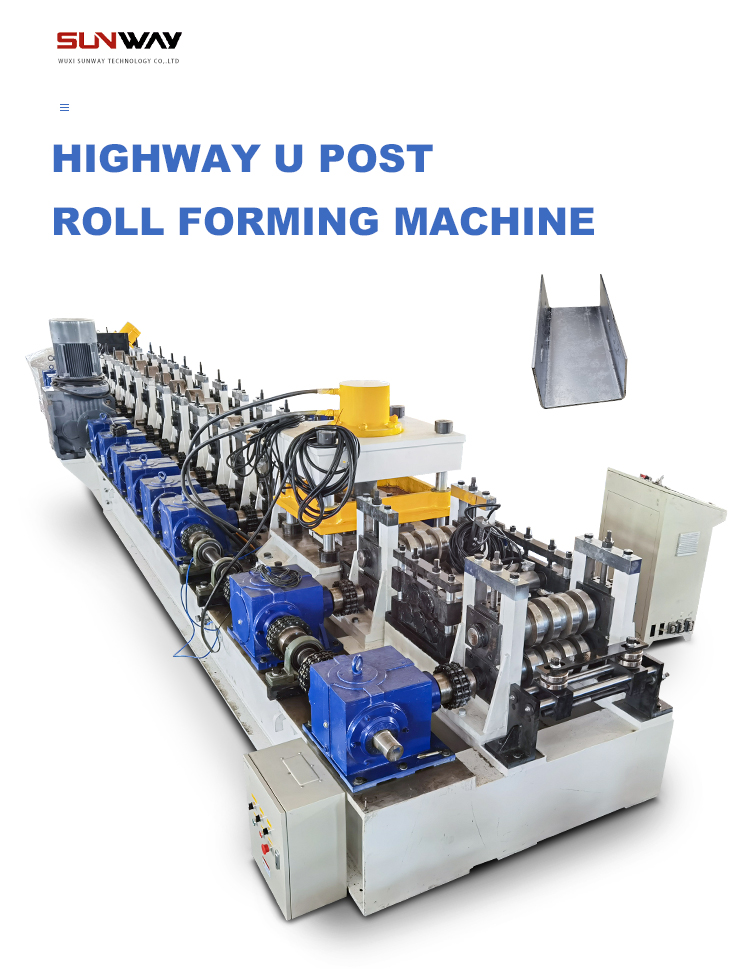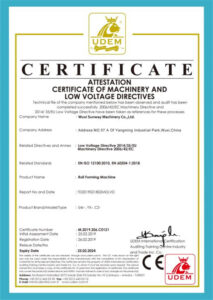Perfiladoras de tejas metálicas son equipos utilizados para producir tejas y paneles metálicos para tejados mediante el curvado y conformado continuos de material en bobina. Estas versátiles máquinas permiten una producción rápida y de gran volumen de componentes para tejados con perfiles personalizados.
Esta completa guía abarca todos los aspectos de las perfiladoras de tejas metálicas, desde los principios de funcionamiento y los componentes principales hasta los modelos, las especificaciones, las aplicaciones y mucho más.
Visión general de las máquinas perfiladoras de tejas para techos metálicos
¿Qué son las perfiladoras de tejas metálicas?
Las perfiladoras de tejas metálicas toman bobinas metálicas planas y las transforman progresivamente en diversos perfiles de tejas mediante una serie de matrices de rodillos y etapas de plegado.
El funcionamiento continuo permite producir en serie componentes de cubiertas como paneles, tejas y tejas con mayor rapidez que con la fabricación manual.
Características principales y principio de funcionamiento
- Perfilado continuo a alta velocidad de bobinas metálicas en perfiles para tejas
- Producción flexible con cambios rápidos del juego de rodillos
- Rodillos y guías dan forma progresiva a la banda plana en perfiles acanalados/corrugados
- Corte automatizado tras la formación de baldosas de longitud fija
- Los desenrolladores sujetan las bobinas de metal y alimentan las bandas a través de las guías de entrada.
- Los soportes de rodillos de conformado con matrices de rodillos realizan curvados y conformados repetidos
- Ajustable en anchura, grosor y material de las bobinas
- Controles basados en PLC para funcionamiento y supervisión automáticos
Principales componentes y sistemas
Las perfiladoras de tejas metálicas incluyen los componentes principales que se describen a continuación:
- Sistema de sujeción de bobinas: El desbobinador o desenrollador sujeta las bobinas de metal y permite la alimentación controlada de la banda a través de las guías hasta el primer soporte de conformado. Los desbobinadores giratorios permiten una alimentación continua sin tiempos de inactividad.
- Alimentar y guiar: Los rodillos de alimentación agarran y tiran de la banda metálica a través de las guías manteniendo la alineación adecuada al entrar en la sección de conformado.
- Puestos de formación: Múltiples soportes con matrices de rodillos realizan curvas y perfiles progresivos a la banda de bobina transformándola en tejas o paneles.
- Unidad de corte: Las cuchillas de corte automatizadas cortan las chapas metálicas conformadas en longitudes fijas de baldosas/paneles para su recogida.
- Transportador y apilador: Las hojas formadas y cortadas se transportan al apilador de salida para su recogida organizada
- Controles: Los controles basados en PLC permiten ajustar los parámetros y automatizar la operación de perfilado
- Marco y carcasa: El bastidor estructural rígido aloja los componentes con cubiertas y protecciones de seguridad
Descripción general del proceso de perfilado
El principio básico de funcionamiento consiste en desenrollar la bobina, enderezarla e introducirla en la sección de conformado. El fleje pasa a través de soportes consecutivos donde los rodillos de precisión realizan curvaturas incrementales. El efecto acumulativo de los múltiples dobleces transforma la banda plana en los perfiles de teja deseados. A continuación, las chapas conformadas se cortan en longitudes fijas y se apilan a la salida.

Tipos de perfiladoras de tejas metálicas
Las perfiladoras de tejas metálicas pueden clasificarse en función de la escala de producción, el método de perfilado y las formas de los perfiles:
Tipos por escala de producción
- Trabajo ligero: Máquinas de menor capacidad para la producción a pequeña escala
- Trabajo medio: Rendimiento equilibrado para las necesidades típicas de las cubiertas metálicas
- Muy resistente: Hormas de gran capacidad para grandes volúmenes
| Tipo | Ancho de bobina | Espesor de la chapa | Velocidad |
|---|---|---|---|
| Trabajo ligero | Hasta 1000 mm | 0,3 - 0,8 mm | 10 - 20 m/min |
| Trabajo medio | Hasta 1250 mm | 0,4 - 1 mm | 15 - 40 m/min |
| Para trabajos pesados | Superior a 1250 mm | 0,5 - 1,2 mm | 25 - 80 m/min |
Tipos por método de conformación
- Formador de rollos: Las matrices de rodillos doblan tiras metálicas en perfiles para tejados
- Prensa plegadora: Los troqueles mecanizados estampan los componentes del techo en una sola acción
- Formador de rollos de panel: Produce paneles metálicos de mayor tamaño
| Máquina | Método | Productos típicos |
|---|---|---|
| Rodillo anterior | Perfilado | Tejas |
| Prensa plegadora | Conformado de la prensa | Láminas de cubierta individuales |
| Enrolladora de paneles | Perfilado | Grandes paneles de cubierta |
Tipos según la forma del perfil
- Costura de pie: Paneles largos con nervios verticales, sin fijaciones a la vista
- Batten Roll: Listones conformados (tapas) sobre paneles de cubierta
- Ondulado: perfiles icónicos de chapa ondulada/corrugada
- Teja Shake: Aspecto similar al de un tejado de tejas o ripias
- Pizarra metálica: Imita las tejas de pizarra tradicionales
- A medida: Perfiles únicos para cubiertas decorativas
| Forma del perfil | Descripción | Ejemplos de productos |
|---|---|---|
| Costura vertical | Paneles largos, costillas verticales | Paneles de cierre a presión, techos de fijación oculta |
| Rollo de sable | Chapas rematadas con listón levantado | Techo metálico con listones, chapas planas conformadas |
| Corrugado | Chapas onduladas/corrugadas | Cubierta ondulada estándar, estilo granero |
| Teja | Láminas conformadas similares a las tejas | Baldosas de tejas entrelazadas |
| Pizarra metálica | Chapa metálica en forma de teja de pizarra | Sistema de falso tejado de pizarra |
| A medida | Perfiles únicos/decorativos | Baldosas de arcilla española en rollo, motivo de escamas de pez |
Especificaciones principales
Las especificaciones clave de una máquina perfiladora de tejas metálicas incluyen:
| Parámetro | Alcance típico |
|---|---|
| Capacidad de ancho de bobina | 1000 - 1250 mm |
| Espesor del metal | 0,3 - 1,2 mm |
| Anchura de la hoja | 500 - 1000 mm |
| Altura del perfil | 10 - 75 mm |
| Velocidad de formación | 10 - 80 m/min |
| Potencia de accionamiento principal | 5,5 - 37 kW |
| Diámetro del rodillo | 100 - 140 mm |
| Número de puestos | 5 – 24 |
| Dimensiones de la máquina | 6000 x 1200 x 1700 mm |
| Peso de la máquina | 2000 - 10000 kg |
- Capaz de procesar bobinas de acero al carbono, acero inoxidable, aluminio y otros metales
- Cambio rápido del juego de rodillos y ajustes del perfil
- Admite bobinas galvanizadas en caliente, prepintadas y acabadas
- Controles CNC para ajustar fácilmente los parámetros
Aplicaciones y usos típicos
Las perfiladoras de tejas metálicas tienen amplias aplicaciones en todos los sectores:
| Industria | Aplicaciones típicas |
|---|---|
| Construcción | Láminas para tejados, revestimiento de paredes, drenaje de tejados, tapajuntas |
| Infraestructura | Grandes almacenes, naves industriales, cobertizos |
| Arquitectura | Detalles decorativos en tejados y fachadas |
| Automoción | Remolques, carrocerías de vehículos, exterior de vehículos recreativos |
| Agricultura | Graneros, establos, refugios, almacenes |
Entre los usos y productos transformados más comunes se incluyen:
- Tejas metálicas, tejas, ripias
- Sistemas de cubierta de junta alzada
- Láminas onduladas y nervadas para tejados
- Perfiles de revestimiento de paredes y fachadas
- Componentes metálicos de drenaje de tejados
- Tapajuntas, goterones, piezas embellecedoras
- Cubiertas y revestimientos de edificios agrícolas
- Paneles de carrocería de remolques y vehículos
Normas de diseño e ingeniería
Las líneas de perfilado de tejas metálicas están diseñadas y construidas conforme a las normas pertinentes:
| Componente | Normas |
|---|---|
| Perfilado | EN 10149, ASTM A568, ASTM A1011 |
| Chapa metálica | EN 10143, EN 10346 |
| Diseño de máquinas | ISO 12100, ANSI B11 |
| Eléctrico | IEC 60204, NFPA 79 |
| Automatización | IEC 61131, PLCopen |
| Fijaciones | AS 3566, FM 4471 |
| Revestimientos | ASTM A755, ASTM A792 |
| Seguridad | Directivas OSHA, CE |
- Los materiales utilizados cumplen especificaciones como el límite elástico, la resistencia a la corrosión y los revestimientos.
- Gestión de calidad según ISO 9001 durante la fabricación
- Seguridad integrada en el diseño, protecciones y controles según las directrices
- Las normas garantizan una larga vida útil y un funcionamiento seguro
Formadoras de rollos Fabricantes y proveedores
Hay muchos fabricantes de equipos que ofrecen perfiladoras de tejas metálicas:
| Compañía | Ubicación | Modelos de productos |
|---|---|---|
| Metform | Turquía | Formadoras de baldosas IMP, líneas onduladas Symphony |
| DIMECO | China | Enrolladoras de tejados de alta resistencia |
| eficacia | Taiwán | Máquinas para paneles de tejado y vierteaguas |
| Formtek | EE.UU. | Perfiladora de cubiertas Maxima |
| China Henan | China | Máquinas para placas de techo de la serie EP |
| Kingsland | Malasia | Máquinas para tejados de chapa ancha |
- Grandes empresas internacionales con alcance mundial y exportaciones
- Fabricantes regionales y nacionales en los mercados de la metalurgia
- Venta directa de los fabricantes
- Máquinas comercializadas a través de concesionarios y distribuidores de maquinaria
El precio depende de las especificaciones, la capacidad, la personalización y otros factores. Como estimación aproximada, los costes oscilan entre $30.000 y $150.000 por línea de perfilado.
Instalación, funcionamiento y mantenimiento
La instalación, el uso y el cuidado adecuados son fundamentales para utilizar eficazmente una perfiladora de tejas metálicas:
| Escenario | Actividades |
|---|---|
| Instalación | - Fijación al suelo, anclaje<br>- Potencia, instalación de servicios públicos<br>- Calibración, pruebas de funcionamiento |
| Operación | - Carga de bobinas de material<br>- Ajuste de parámetros<br>- Cambio de juego de rodillos |
| Mantenimiento | - Inspecciones, lubricación <br>- Mantenimiento de componentes<br>- Control del desgaste/daños |
- Instale las máquinas en una superficie plana y nivelada
- Instalación de los servicios adecuados: eléctricos, neumáticos e hidráulicos.
- Pruebas para comprobar el rendimiento tras la instalación
- Control de avances, perfiles y velocidades para la estabilidad del proceso
- Programar el mantenimiento preventivo durante las pausas de producción
- Sustitución de consumibles como juntas, correas y lubricantes
Una instalación, un funcionamiento y un mantenimiento adecuados garantizan el máximo tiempo de producción y la máxima calidad de las cubiertas.

Cómo elegir el perfilador de tejas metálicas adecuado
A continuación se indican los factores clave que deben tenerse en cuenta al seleccionar un sistema de perfilado de tejas metálicas:
| Criterios | Descripción |
|---|---|
| Capacidad | Ajustarse a las necesidades de volumen de producción |
| Ancho de bobina | Adecuado para los anchos de hoja requeridos |
| Espesor del metal | Acepta el grosor de material deseado |
| Gama de perfiles | Formas necesarias perfiles de techo |
| Velocidad | Índice de producción adecuado |
| Ajustabilidad | Permite modificar los parámetros |
| Controla | Capacidad de funcionamiento automatizado |
| Rigidez del bastidor | Soporta elevadas fuerzas de conformado |
| Servicio de asistencia | Ayuda a la instalación, acceso para mantenimiento |
| Presupuesto | Costes y valor globales |
- Analizar las necesidades de producción y el crecimiento de la empresa
- Preseleccionar modelos de fabricantes reputados que satisfagan las necesidades
- Seleccione una máquina robusta y flexible que cumpla las normas de calidad
- Garantizar una asistencia posventa adecuada por parte del proveedor
- Compare precios y el coste total de propiedad de las alternativas
La elección de la especificación y la capacidad correctas de la primera bobina se traduce en un mejor rendimiento de la inversión y una mayor productividad.
Ventajas e inconvenientes de las perfiladoras de tejas metálicas
Algunas de las principales ventajas y limitaciones de las máquinas perfiladoras de tejas metálicas son:
| Pros | Contras |
|---|---|
| Producción rápida de hojas largas | Limitado a perfiles laminados |
| Ideal para cubiertas metálicas en grandes volúmenes | Menor flexibilidad en comparación con las plegadoras |
| Calidad homogénea en grandes lotes | Limitado por la capacidad máxima de ancho de bobina |
| Juegos de rodillos intercambiables para cambios de perfil | Importante inversión de capital inicial |
| Compacta en comparación con las líneas de soldadura por puntos | Requiere ajuste y manejo por expertos |
| Costes inferiores a los de la fabricación alternativa | Mantenimiento complejo con muchos componentes |
Principales ventajas
- El conformado continuo a alta velocidad a partir de bobinas aumenta la producción
- Perfil y calidad uniformes en toda la longitud de la hoja
- Producción flexible con cambio rápido del juego de rodillos
- Ocupa poco espacio en comparación con los métodos de corte y plegado
Limitaciones
- Sólo produce perfiles fijos, formas personalizadas limitadas
- Mayores necesidades de mantenimiento que las máquinas más sencillas
- Coste de capital significativo para la producción pesada
Para la mayoría de los fabricantes de cubiertas, las ventajas de productividad de las líneas de perfilado superan las limitaciones.

Preguntas más frecuentes
| Pregunta | Respuesta |
|---|---|
| ¿Qué perfiles se pueden producir? | Entre los perfiles más habituales se encuentran los de junta alzada, ondulado y teja de agitación. También son posibles perfiles personalizados. |
| ¿Qué metales pueden formarse? | Bobinas de acero al carbono, acero galvanizado, aluminio y acero inoxidable. |
| ¿Cómo se ajusta la máquina? | Los principales parámetros como perfiles, velocidades y avances se ajustan en los controles PLC. La alineación mecánica se realiza con galgas. |
| ¿Qué gama de espesores es posible? | Las máquinas estándar aceptan material de 0,3 a 1,2 mm de grosor. |
| ¿Cuál es la longitud de las hojas formadas? | Longitud determinada por cuchillas de corte de 0,5 - 5 metros. |
| ¿Qué mantenimiento requiere? | Programar la lubricación, inspeccionar/sustituir los elementos de desgaste, calibrar los sensores y monitores. |
Aquí se tratan los aspectos básicos de las capacidades, características y funcionamiento de las perfiladoras de tejas metálicas. Póngase en contacto directamente con los fabricantes para obtener presupuestos y más información.
Conclusión
Las perfiladoras de tejas metálicas permiten la producción rápida de diversos componentes para tejados, como tejas, paneles y productos de drenaje. Estas versátiles perfiladoras transforman bobinas planas de chapa metálica en tejas completas mediante una serie de rodillos de plegado y conformado.
Los factores clave a la hora de seleccionar las perfiladoras de cubiertas metálicas adecuadas son la capacidad requerida, la anchura de la bobina, la gama de espesores del metal, los perfiles de cubierta y las velocidades de perfilado. Los principales fabricantes ofrecen máquinas desde compactas para trabajos ligeros hasta básculas de producción para trabajos pesados.
Una instalación, configuración de controles, funcionamiento y mantenimiento preventivo adecuados son necesarios para lograr una alta productividad y calidad de la cubierta. Las cubiertas metálicas en rollo ofrecen durabilidad, flexibilidad de diseño y fabricación económica.


